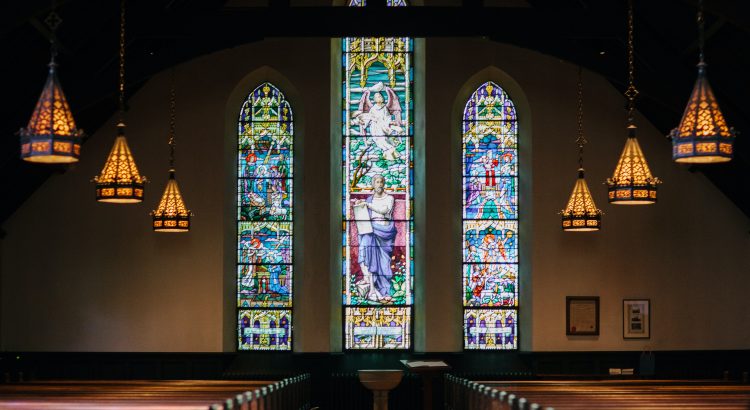Mine didn’t. Why did yours?
Again and again, we slip into talking about the church as if it is a place rather than the people.
What has been heartening for me over the past little while, as we have connected across faiths, is that even across different religions, national faith leaders have emphasised that the nature of their faith goes beyond bricks and mortar.
I can understand that, for many people, going to a particular place or location can help them tune into God. My family is feeling the effects of living in a very urban area ourselves. This is particularly tough on my wife who grew up in a beautiful part of the North Coast of Ireland and is longing for the sea. I have always found that going into nature gives me peace and perspective.
Or, when going into a great cathedral or a little chapel, we may remember the work and commitment it took over many years to build them. Contemplating that effort and expense undertaken can help us appreciate “those who have gone before” and it may well aid us in our worship. However, it seems to me that, if we are not careful, the functions of faith institutions and buildings will become more important than faith itself.
Jesus was about relationship. He was not about meetings in buildings. Right at the start of his ministry, when he called the disciples, we read that he appointed the Twelve that “they might be with him” (Mark 3 v 14). Jesus was interested in relationship for himself, but he was also acutely aware of the need for relationship and community that we all have. We often consider someone’s last words as being particularly significant. Thus, it is important to note that, as he was on the cross (which but for the resurrection many would assume was the end of his life), Jesus looked to his mother and to his beloved disciple and formed a relationship between them. At this great moment of importance, Jesus recognises the need for community and relationship; he does not ask for a monument to be built, he does not set up a trust fund, he connects people.
When Jesus saw his mother there, and the disciple whom he loved standing nearby, he said to her, “Woman, here is your son,” and to the disciple, “Here is your mother.” From that time on, this disciple took her into his home.
John 19:26 -27
It’s very easy to get distracted by rules and regulations pertaining to institutions, organisations, and buildings and lose sight of relationship and communities.
It has been fascinating to serve the government and the wider faith community on the Task Force related to places of worship, formed by Government ministers in May 2020. I recognise the importance of different rituals and practises to different faith communities and, at my organisation FaithAction, we fight tooth and nail for those things. We strive to advocate for faith by providing practical solutions and advice to government, as well as pragmatic responses for faith.
The Government cannot close the Church – it can only close buildings.
However, church has not stopped. The word ‘church’ in the New Testament always related to people not to a building, thus I cannot go to church – but instead I meet with the Church.
There is now greater opportunity to share life, to pray and to serve, and our focus should not be on how we can squeeze in smaller socially-distanced religious services, or just to switch everything online (or by phone). Instead, let us ask, “How should we express faith at this time?” and “How do we commit to shared life/relationships/loving our neighbours within the restrictions, or even beyond them?”
Not so much a building,
more a way of life…
Why do I say ‘beyond restrictions’? This crisis has caused seismic changes in our world. At the start of the year, those in lower-skilled roles were being classified as not worthy for visas, or even leave to remain. But a few days into March, these very same workers (supermarket shelf stackers, delivery drivers, as well as all the many auxiliary roles in the NHS and care system) became essential workers! On the other hand, highly-paid and highly-skilled white-collar workers found themselves furloughed. That topsy-turvy experience is just one of many since lockdown started and the COVID-19 crisis hit.
This experience has truly shaken things up and has meant people have lost some faith in the normal way life was progressing. Things that were important seemed less important than before, and there are new priorities, new ways of viewing life. We even sign our letters and emails differently: ‘stay safe’ we say – and we mean it.
Now is not the time to re-establish comfy religious services for a Christian club. Now is the time to be salt and light, to be a city on a hill, to show a different way of life. We should look out for the widow and orphan in our society. The widow is the one without economic independence – otherwise known as the poor and needy. The orphan is the one without family, community or belonging. In our society today, some will find themselves in need; financially, emotionally, socially and spiritually. In our society today, many find themselves isolated; alone, unconnected and without meaningful family.
If, at this time, all we do is move our services online, become slick at reproducing a kind of pastiche of what we had in person back in February, we have missed out on our mission.
Some of us find lockdown and social distancing painful and frustrating, but some must admit that they like this different pace of life and the ability to cocoon. We must be challenged to be like Jesus, to be looking to provide community to those who are isolated, those who are grieving and those who are rejected by society.
History tells us that, in the past, it was often Christians who provided hospitality in the most difficult of situations. Many of us know that hospitality is not about having money, a spacious house, or good cooking skills. It’s about a position of heart. If we do not have the right heart– or put it this way: if we do not have love – the most fancy three-course meal will taste like ash, compared with the soggy toasted sandwich delivered with love to someone who is isolated.
Close enough to know, love enough to care and willing to pay the price
Oft-quoted thought by my father John Singleton
Daniel is a gifted speaker, particularly on the topics of how community groups can partner with government, the role of faith in local services, and how to engage the community in local action.
Daniel previously worked as a history teacher in a London secondary school and later as training and development manager for a large voluntary sector organisation in east London.


